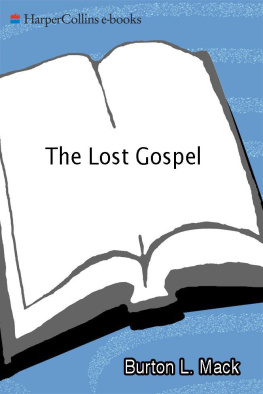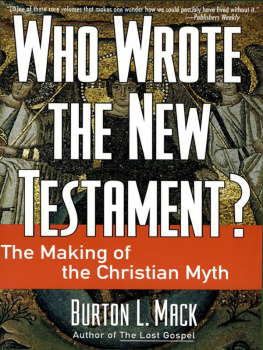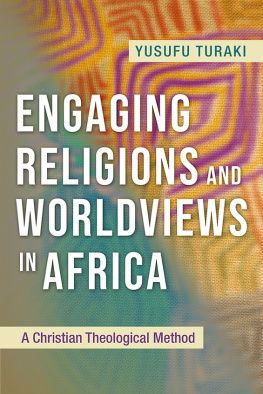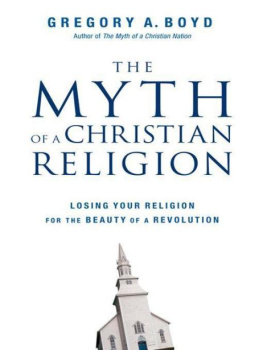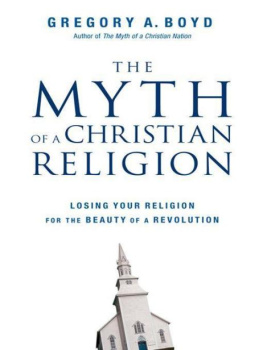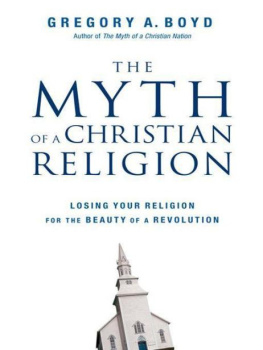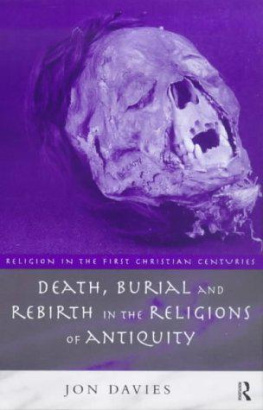THE RISE AND FALL OF THE CHRISTIAN MYTH
THE RISE AND FALL OF THE CHRISTIAN MYTH
RESTORING OUR DEMOCRATIC IDEALS
BURTON L. MACK

Copyright 2017 by Burton L. Mack.
All rights reserved.
This book may not be reproduced, in whole or in part, including illustrations, in any form (beyond that copying permitted by Sections 107 and 108 of the U.S. Copyright Law and except by reviewers for the public press), without written permission from the publishers.
Yale University Press books may be purchased in quantity for educational, business, or promotional use. For information, please e-mail (U.K. office).
Set in Meridien and Futura types by Integrated Publishing Solutions.
Printed in the United States of America.
Library of Congress Control Number: 2016930354
ISBN 978-0-300-22289-0 (hardcover : alk. paper)
A catalogue record for this book is available from the British Library.
This paper meets the requirements of ANSI/NISO Z39.48-1992 (Permanence of Paper).
10 9 8 7 6 5 4 3 2 1
CONTENTS
THE RISE AND FALL OF THE CHRISTIAN MYTH
INTRODUCTION
Early readers of this project have suggested that I tell how I journeyed from the spirit-centered evangelical Christianity of my youth to the view I present in what follows, deemed radical and controversial by some as it has evolved.
This book is about the cultural influence of the Christian myth. As a boy in the Church of the Nazarene, where my father was a pastor, I had no concept of what I now call the Christian mentality, but I did know about the pervasive aura and influence of what the Nazarenes referred to as the Holy Spirit. The Nazarenes had emerged from Methodism toward the end of the nineteenth century. They cultivated the personal experience of sanctification and the quest for purity of heart, having rejected the formalism of the Methodists and other mainline churches. They knew that they were Christians, but had no concept of Christianity as a religion concerned about society as did other Protestant churches. Their view of the world beyond the borders of the church was that it was dirty and dangerous. Their focus was upon the cloistered community of the Holy Spirit. I experienced this atmosphere as suffocating, an encompassing environment demanding obeisance without any clarity about the reasons for being obedient. I raised some questions about the cluster of prejudices used to mark the world outside, only to find that my Christian community did not have rational reasons for their attitudes. In high school I had friends like Bob Lacanale, a paraplegic whose father brewed homemade beer (a no-no for the Nazarenes), and Zek, a Syrian Muslim with whom I played chess, sometimes at his home in a curtained-off room (about which my parents raised their eyebrows). Neither of these friends was dirty or sinful in my view, but my Nazarene Christian elders looked down upon them, and I did not know why.
High school in Portland, Oregon, was a wonderful change of atmosphere. Math and science opened up large and exciting worlds to explore that called for curiosity and critical thinking. When I graduated I was offered the Bosch and Lomb scholarship to Yale University. I was quite proud of it. But when I told my father about it, he said that I could not go to Yale because it was a worldly and sinful school. I would be going to Pasadena Nazarene College, where I could learn about Holiness Christianity from H. Orton Wiley, one of the founders of the Church of the Nazarene. I did that, of course, dutifully, and managed to write a masters thesis on the concept of love (agape) in the New Testament. And because Pasadena Nazarene was a college that trained teachers and ministers, it was taken for granted that I should become a minister.
I was appointed to the church in Corcoran, California, where I found myself in the cotton country of J. G. Boswell, founder of what is still the largest private farm in the country. There Caterpillar D8s tilled the fields in sections, pulling harrows fifty feet wide behind as the tractor plied a straight line for a quarter mile before turning around. Mexican migrants lived in cotton camps outside of town. (The migrants were called wetbacks in those days.) The local Methodist minister befriended me, and we participated in the founding of the Kings County Migrant Ministry, my first experience of social and cultural inequalities in the big world outside the church. The cotton camp was close by and needed water and toilets. We waited upon J. G. Boswell, who gave the ministry $5,000 to make some improvements, and the Tulare Migrant Ministry visited our congregations to tell us that Jesus wanted us to care for the least of these. I was not sure what I thought about the situation, but I had some encouragement from the Ministerial Association and the leaders of the Migrant Ministries in other counties of the San Joaquin Valley to begin thinking of Christianity as having concerns for the well-being of migrant laborers. The Church of the Nazarene, however, was not able to think with me about such a project, much less allow me to use the resources of the church to address the physical needs of the cotton pickers. As H. Orton Wiley was remembered to have said, in relation to the storefront churches in downtown Los Angeles in the 1930s, you have to decide whether to be a mission or a church.
I was transferred west to the Nazarene church in Santa Paula (self-described Citrus Capital of the World), where, fortunately, the local Episcopal and Presbyterian ministers understood my quandaries and let me discuss with them the Christianity they thought we all shared. They had no idea how little I had learned about Christianity from the Nazarenes, and how completely dependent upon them I was for this intellectual introduction to what later might be called the Church in the World. They said I had three choices if I wanted to transfer membership to a church that had a social ethic: the Methodists, the Presbyterians, or the Episcopalians. When Ted Gill, a newly installed president of San Francisco Theological Seminary, was invited to address the local Presbytery, I was invited to attend. After an informal get-acquainted lecture about his familys place in the economy and his own participation in Martin Luther King Jr.s Selma march, I was introduced to him as a Nazarene considering the Presbyterian Seminary. He looked me in the eye, smiled, and said I would be welcomed. I decided to go to San Francisco in order to pursue my education in Christianity and the world.
The seminary experience turned out to be my enlightenment, what with the learning of Greek, Hebrew, and a bit of Aramaic, as well as my first serious review of the history of Western civilization (it was actually church history). The Bible was central. Theology provided the intellectual system for thinking about Christian beliefs. And social history was the arena within which the Presbyterian Church had its place and mission in the world. A bigger picture was in the process of forming as my introduction to the church as a social institution. My enlightenment had a profound effect upon the aura of the spiritual environment I had experienced in the Church of the Nazarene. The Nazarene worldview did not have a big picture of the world around it, or any indication of the structure or logic of its own world. It was actually not more than a bubble of sensibility that kept Christians worried about the purity of their souls. But now, in the Presbyterian Church, it was no longer the Spirit, but a certain placement of the Christ, the Gospel, the Bible, and history that expanded the horizons of the Christians worldview and gave it some rationale.


